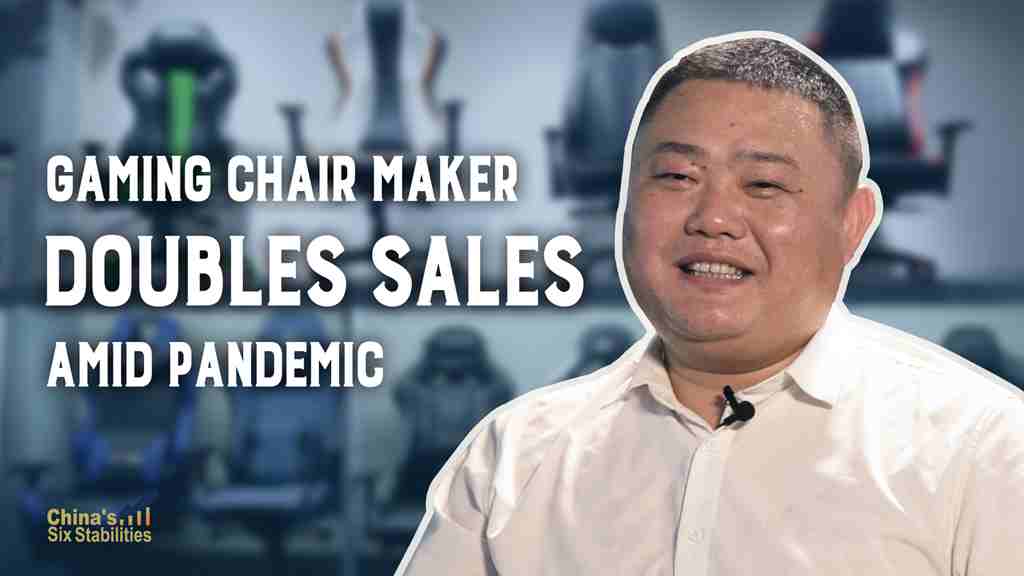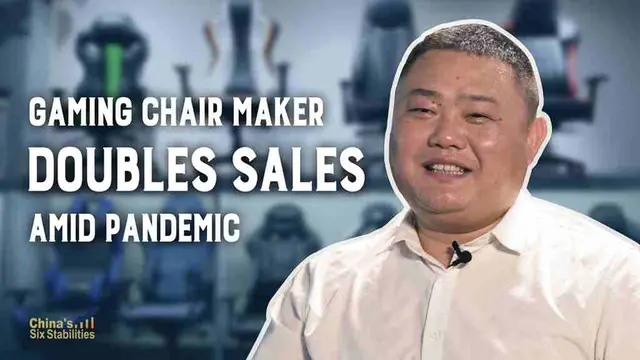
The COVID-19 pandemic has caused millions of cases of shutdown, bankruptcy and unemployment, but a Chinese chair maker has doubled his sales during this unprecedented period.
The manufacturer Xue Dong has been making ergonomic chairs, which mainly refer to the office and gaming chairs, for nine years. His company, Anji Wanbao Smart Home Technology, locates in a small county Anji in East China's Zhejiang Province, which is well known for its bamboo groves and furniture industry. At the same time, his chairs are exported to most of the places in the world.
"The COVID-19 pandemic this year hasn't been negative for our company," said Xue. "Our sales volume has doubled compared to last year."
Xue opened two new plants during the pandemic to satisfy the surging demand of his chairs. More than 500 hundred employees work for him day and night. However, all these successes started from an 800 square meter plant and a 30-member crew, and it was not smooth sailing.
Why they made it, but I lost
In 2011, Xue came to Anji county to help his sister operate a poor-managed company. At the time, he was running a logistics business in another city in Zhejiang Province, owning 15 trucks. In Xue's words, his life is "pretty OK."
He thought he would just stay a couple of days, but opportunities caught him. He decided to open an ergonomic chairs manufacturing company and gradually moved his work focus out of logistics.
"I barely knew anything [about the chair industry]," Xue told CGTN, adding that he could not get any orders at the time since he was just a new bird without any knowledge in the chair market.
"One year into it, I lost several years of earnings from the past, doing logistics, which was nearly 4 million yuan (about $620,000 in 2011)," said Xue.
Xue's families tried to persuade him to move back to his logistics business. Xue himself was disappointed with the loss too, but he couldn't put his dream down.
"Why could others run a chair business well? Why did I lose?" he said.
Since then, Xue got careful and humble. He said he would rather not look for orders, but made himself a technical manager – pushing himself to make every detail of ergonomic chairs clear. Xue spent half a year clarifying all the technical standards, from the craftsmanship to the hardware's size, and often stopped by bigger companies to learn the industry knowledge.
In his effort, from 2012 to 2016, Xue did not lose again. He both sold his chairs on Alibaba-owned Chinese's e-commerce platform Tmall and to overseas corporate buyers, but none of the sales could take his company to another level until he met a cross-border e-commerce platform.
In 2017, Xue started to sell his products on Amazon and Alibaba for global buyers. His company's sales volume roses for the following three consecutive years, even as the China-U.S. trade war tension has risen.
According to the manufacturer, about 60 percent of his chairs go to the U.S. market, 30 percent hit the European market, and the other 10 percent go to East Asia, etc. Prices range from $169 to $299.
Chair sales boost amid pandemic
Xue's gaming and office chairs sales have doubled during the pandemic due to the surging demand, though the country's production of furniture is lower this year.
The COVID-19 pandemic has forced people to work and play from home, which means people will sit in front of their computers longer than before. It is estimated that the global gaming chair market will see a 5.23 percent growth in 2020, according to Technavio. And it is expected to grow by $71.3 million during 2020-2024 as the e-sports industry has been hot for years.
Xue said the sales during a pandemic are like on Black Friday or Cyber Monday. He opened up two new plants in April and asked his"brother companies" to help with production to meet the demand.
"From January to June, our production value reached the total value of 2019," said Xue. "This year it is expected to be 100 to 120 percent higher than last year, which is equal to $250 million or more."
Since Anji County has never had any coronavirus case, Xue's factory was shut down for only 10 days in mid-February during the pandemic. Nevertheless, that was right after China's biggest national holiday, Spring Festival, when millions of migrant workers return home and couldn't go back due to the COVID-19. Xue once faced an empty factory.
"I want to say 'thank you' to our county government. They did an excellent job." said Xue, referring that the local government rented chartered buses and high-speed trains to bring workers back from Yunnan, Guizhou, and Sichuan Provinces, which are three major labor-outsourcing provinces in China.
"It just took a few days for them to fill our factories, and we were in dire need of them," added Xue.
China's strict containment on coronavirus has made the resumption of manufacturing faster than many other countries. The whole country's exports have surged since June, and the business activities have kept expanding since February.
Along his journey, Xue told CGTN the proudest thing he has ever done is that he has promoted his brand to 8th place in the United States and Europe in 2019.
"I will make it to number one in the world," said Xue.
Beijing
Hong Kong
Tokyo
Istanbul
New Delhi
Singapore
Damascus
Baghdad
Islamabad
Seoul
Brussel
Moscow
Canberra
Cairo
Nairobi
Johannesburg
Washington,D.C.
Los Angeles
Rio de janeiro
1073km
 简体中文
简体中文





